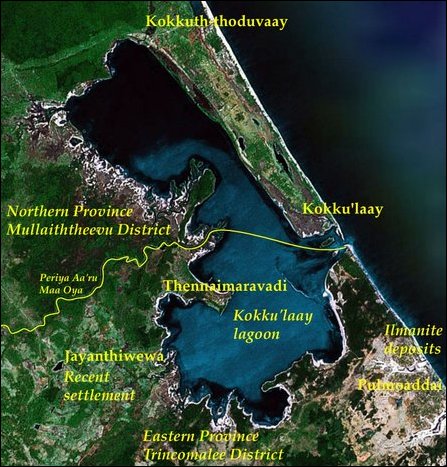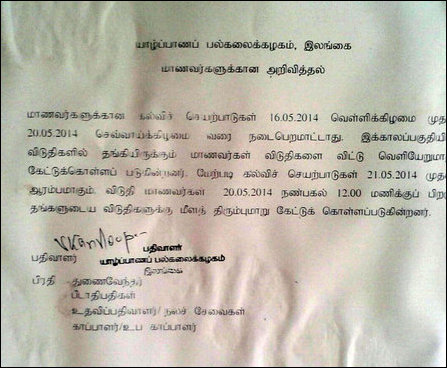Genocidal Sri Lanka, abettors, appropriate urbanisation of Eezham Tamils
[TamilNet, Friday, 09 May 2014, 19:37 GMT]
For nearly 500 years, the nation of Eezham Tamils has been denied of effective urbanisation of their own, by the successive colonial regimes of the Portuguese, Dutch and the British, who groomed Colombo as the only urban centre to politically and economically control the island. Genocidal Colombo’s Sinhala military and the abettors in New Delhi, Washington and Beijing now take away the Eezham Tamil right to urbanisation by building Sinhala military capitals in the so-called Palaali ‘High Security Zone’ and in Trincomalee. A nation that doesn’t have its own urban centres and control over infrastructure would be easily enslaved, commented an academic in Jaffna.
Further observations by the academic in Jaffna:
The occupying Sinhala military appropriating thousands of acres of land of displaced Eezham Tamils around Palaali and in both sides of the Koddiyaaram Bay in Trincomalee, including Champoor; erecting fenced enclaves; building harbours, airports and infrastructure facilities such as power stations within the enclaves and the occupying military operating industries and ‘tourism’ within the enclaves, are clear evidences for Colombo building new Sinhala military-political-commercial capitals in the country of Eezham Tamils. It is like the Portuguese building Colombo for the decimation and eventual annihilation of Kotte, the capital of the natives in the south, the academic said.
The US-trained Sinhala military commander occupying Palaali, summoning the Jaffna University Vice-Chancellor and the faculty of the university to “Thal-hevana” (a Sinhala name given to a resort hotel) within this new enclave, to discuss matters over the closure of the university for Mu’l’livaaykkaal remembrance week, is only a tip of the iceberg of the unfolding scenario, the academic said.
The Establishments in complicity, i.e., Washington, New Delhi and Beijing not only refuse to accept the genocide, the on-going structural genocide and the sovereignty cum right to self-determination of the nation of Eezham Tamils, but also deny their right to development and urbanisation of their own.
By endorsing the military occupation in international forums such as the UNHRC, by having ‘military to military relationship,’ and by flooding the Sinhala military with material support to build the new enclaves, Washington, New Delhi and Beijing respectively are in active complicity with the structural genocide engineering that is taking place.
However, New Delhi eying on Palaali and Trincomalee is the worst of the culprits. Some gullible sections among Tamils think that the Sinhala nation could never be a ‘true friend’ but the Tamil nation is a ‘natural friend’ of India, and New Delhi would eventually learn the lesson. But a junta in New Delhi always thought in the opposite direction.
Haunted by the paranoia of its own deeds, there is a tendency in some imperialist sections in India to view Muslims, Christians, tribals. Naxalites, Northeast states peoples, as well as Dravidianism, as forces destabilising New Delhi. This section of policy makers in India, coupled with the tradecraft of corporates, as well as extra-parliamentary elements such as the intelligence, bureaucracy, media and possibly the military, finding genocidal Colombo a ‘natural ally’ should not be overlooked.
Chronology:
For nearly 500 years, the nation of Eezham Tamils has been denied of effective urbanisation of their own, by the successive colonial regimes of the Portuguese, Dutch and the British, who groomed Colombo as the only urban centre to politically and economically control the island. Genocidal Colombo’s Sinhala military and the abettors in New Delhi, Washington and Beijing now take away the Eezham Tamil right to urbanisation by building Sinhala military capitals in the so-called Palaali ‘High Security Zone’ and in Trincomalee. A nation that doesn’t have its own urban centres and control over infrastructure would be easily enslaved, commented an academic in Jaffna.
Further observations by the academic in Jaffna:
The occupying Sinhala military appropriating thousands of acres of land of displaced Eezham Tamils around Palaali and in both sides of the Koddiyaaram Bay in Trincomalee, including Champoor; erecting fenced enclaves; building harbours, airports and infrastructure facilities such as power stations within the enclaves and the occupying military operating industries and ‘tourism’ within the enclaves, are clear evidences for Colombo building new Sinhala military-political-commercial capitals in the country of Eezham Tamils. It is like the Portuguese building Colombo for the decimation and eventual annihilation of Kotte, the capital of the natives in the south, the academic said.
The US-trained Sinhala military commander occupying Palaali, summoning the Jaffna University Vice-Chancellor and the faculty of the university to “Thal-hevana” (a Sinhala name given to a resort hotel) within this new enclave, to discuss matters over the closure of the university for Mu’l’livaaykkaal remembrance week, is only a tip of the iceberg of the unfolding scenario, the academic said.
The Establishments in complicity, i.e., Washington, New Delhi and Beijing not only refuse to accept the genocide, the on-going structural genocide and the sovereignty cum right to self-determination of the nation of Eezham Tamils, but also deny their right to development and urbanisation of their own.
By endorsing the military occupation in international forums such as the UNHRC, by having ‘military to military relationship,’ and by flooding the Sinhala military with material support to build the new enclaves, Washington, New Delhi and Beijing respectively are in active complicity with the structural genocide engineering that is taking place.
However, New Delhi eying on Palaali and Trincomalee is the worst of the culprits. Some gullible sections among Tamils think that the Sinhala nation could never be a ‘true friend’ but the Tamil nation is a ‘natural friend’ of India, and New Delhi would eventually learn the lesson. But a junta in New Delhi always thought in the opposite direction.
Haunted by the paranoia of its own deeds, there is a tendency in some imperialist sections in India to view Muslims, Christians, tribals. Naxalites, Northeast states peoples, as well as Dravidianism, as forces destabilising New Delhi. This section of policy makers in India, coupled with the tradecraft of corporates, as well as extra-parliamentary elements such as the intelligence, bureaucracy, media and possibly the military, finding genocidal Colombo a ‘natural ally’ should not be overlooked.
Chronology:
Related Articles:
07.05.14 SL commander warns students against Mu'l'livaaykkaal remembr..
03.05.14 Uprooted Champoor Tamils in Trincomalee: ‘Tell the world our..







